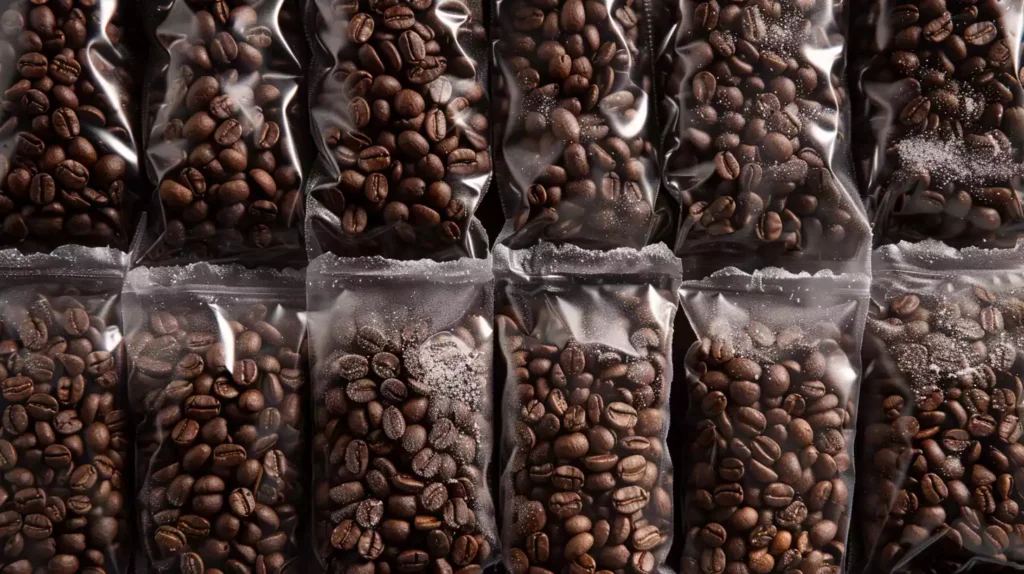One of the things about coffee is they start to deteriorate the moment they leave the roaster. As a result, most coffee roasters advise their customers to finish the coffee within 14 days after roasting.
However, this may not always be possible, which may make you think about the long-term storage of coffee beans. Will cold storage work? Can you freeze coffee beans?
You can freeze coffee beans. It is a good option to preserve the freshness of the coffee beans. However, you must keep them in airtight packaging when freezing them and thaw the beans with the lids closed to prevent moisture from the freezer from seeping into the beans.
This article discusses if you can freeze coffee beans. It will also look into when you should consider freezing your coffee beans and show you how to do it.

Can You Freeze Coffee Beans?
You can freeze coffee beans. Aside from preserving its freshness, freezing coffee beans also help them to grind better with the grinder. However, you should protect the beans from the moisture and smell inside the fridge.
Preserving coffee beans is a tricky subject. Most coffee experts believe coffee should not be stored long-term and should be brewed and drunk as soon as it is roasted. Most of the time, the advice is to keep it in a dry, cool place for up to 14 days.
However, if you cannot finish it, what’s the next option? Freezing it. There are several reasons why freezing is a good idea.
Frozen Beans Retain Flavors Better
Sometimes, freezing some food actually makes it taste better. For example, think about your grandmother’s bolognese sauce or chicken soup. Would the same concept work for coffee beans?
Yes, to a certain extent.
When left unbrewed for a long time, what happens is that the oils inside the coffee beans begin to lose their freshness. It interacts with the oxygen in the air and oxidizes. Oxidation results in the oil becoming stale and eventually rancid.
When you freeze the coffee beans the right way, you may be able to keep the oils fresh longer and prevent oxidation. Freezing may not be able to keep it super fresh, but it is probably your best option.
Frozen Beans Grinds Better
Another reason to freeze coffee beans is not so much about their freshness but to make them grind better. Generally, when you grind coffee beans, what happens is that you end up with three grind sizes:
Fines: These are overly fine grinds that are smoother than what is set in the grinder. These fines may easily over-extract when brewing, resulting in acidic, tannic coffee.
Boulders: These are overly large grinds that are larger than what is set in the grinder. These boulders usually get under-extracted during brewing, meaning some of these boulder grinds may be wasted.
Optimals: These are the perfect grinds that you want to have. They extract well during brewing.
Good grinders can reduce fines and boulders and increase optimals. In fact, serious coffee makers spend thousands to get the best grinders for this purpose.
Fortunately, you have a cheaper option. Some coffee experts believe that frozen beans actually grind better. By freezing your beans and then grinding them, you are more likely to have more optimals and fewer fines and boulders.
When Should You Freeze Coffee Beans?
Freezing coffee beans is the next best thing when you cannot finish all your beans or have a bag of high-quality coffee beans you intend to drink slowly and savor. However, the best way to enjoy your coffee is to brew and drink it within 14 days after roasting.
Freezing coffee beans should not be your default choice, as they may not fully preserve the freshness of your coffee beans. However, it is the next best choice when:
You Cannot Finish Your Coffee On Time
Suppose you just picked up a fresh bag of coffee from Volcanica, only to receive a notice that you must travel and leave home for a week-long work trip. That means you are left with 4 days to finish a coffee bag. This would not work.
In situations like this, you better freeze your coffee beans than let them stale. If you freeze it, it may not be as fresh, but it’ll still be good enough to enjoy when you get back.
You Have Premium Coffee Beans You Want To Savor
Suppose you splurge some top dollars and pick up some fancy coffee such as the Kona Peaberry, Jamaican Blue Mountain, or Kopi Luwak Coffee.
The last thing you want is to rush yourself to finish them in 14 days before they go stale.
In this case, you may better break the beans into small batches and then freeze them. Only take out a small batch when you want to savor some.
Is Freezing Coffee Beans an Effective Method for Keeping Them Fresh?
Freezing coffee beans is a popular method for keeping grounds fresh. By storing them in an airtight container and placing in the freezer, the beans can maintain their flavor and aroma for longer. However, it’s essential to avoid moisture and temperature fluctuations to ensure effectiveness. Follow these tips for keeping grounds fresh.
How Do You Freeze Coffee Beans?

To freeze coffee beans, separate your beans into small, daily batches. Then place them in separate airtight packaging, and remove as much air as possible. Label the coffee type and freezing date if required, and freeze away. Only take out what you need, and allow up to 30 minutes to thaw.
Freezing coffee beans are not rocket science. You just need the right things and to do them properly.
- Start by freezing the freshest beans you can get. The fresher the beans, the more flavor and aroma you keep when you freeze them.
- Ensure the coffee is clean and dry. Dry and clean coffee beans should freeze well and not develop mold.
- Break into small portions. It may be a good idea to break them into daily batches. It takes around 56 beans to make a cup of coffee if you need guidance. If you drink two cups daily, a portion should have 112 beans.
- Store in an airtight container. Keep each portion in separate containers. If you can, use freezer-face plastic bags and containers.
- When storing, pack as tight as possible to remove air from the packaging. Use a vacuum to suck out air from the container if you can.
- Label the container if you see the need to. Note down the type of coffee and the day you freeze it on tape and stick it on the container.
- Store in the freezer. Ensure the packages are not in contact with other frozen food.
- Only take out the coffee beans when you need them. When thawing, allow the packaging to thaw at room temperature for 30 minutes before opening the container. This prevents the air and moisture from rushing into the frozen beans, which may ruin them.


Really appreciated this article! I’ve always been a bit skeptical about freezing coffee beans because I worried it might affect the flavor negatively. But the explanation about how it can actually preserve the beans’ freshness and even improve the grind is super enlightening. I’ll have to give this a try with our next batch of specialty beans at the cafe. Thanks for sharing, Emma!
Does freezing affect all types of coffee beans the same way? I mainly use Kona and wonder if the delicate flavors might be compromised.
i wondered the same cuz i use a lot of lighter roasts and don’t wanna lose any special flavors
In my experience, as long as you’re keeping the beans in an airtight container, it shouldn’t matter much. It’s more about keeping moisture out than anything else.
Great, another thing to remember. As if making coffee wasn’t complicated enough.
Interesting point about frozen beans grinding better. I’ve read a study suggesting that cold beans fracture more uniformly, leading to a more consistent extraction. However, that research didn’t look into long-term storage effects. I’d be curious to know if there’s a ‘sweet spot’ for freezing duration that optimizes both flavor preservation and grind quality.
lol, freeze coffee beans? might as well store my wine in the freezer.
Didn’t know you could freeze coffee. I’ll try it out, might save some bucks if it keeps longer.
Your segment on frozen beans retaining flavors better raises some interesting points. Freezing is a common technique in food preservation, so it’s logical it might work well for coffee beans. However, considering the volatile compounds responsible for coffee’s flavor profile, there might be nuances in freezing techniques that could either preserve or degrade these compounds. A detailed study into this could provide enlightening insights for both consumers and professionals in the coffee industry.